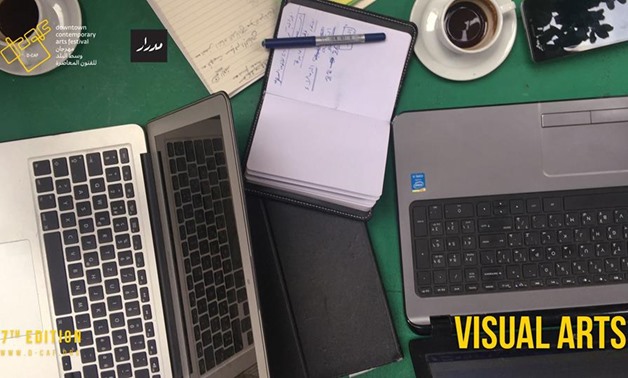
Caption: Roznama Studio Program - D-CAF official Facebook page
CAIRO – 26 March – 2018: The seventh edition of D-CAF witnessed for the first time the hosting of Roznama Studio program designed by Medrar for Contemporary Art.
“Roznama is an annual competition and exhibition for contemporary visual artists tailored to support creative contemporary practices of Egyptian artists under the age of 30 by highlighting and awarding the outstanding genuine works beyond their medium,” recounted Nour El Safoury, one of the program designers.
Medrar issued a statement in November 2017 announcing the reasons behind the cancellation of the sixth edition of Roznama’s competition. Ali El Sebai, the visual arts and arts for all coordinator in D-CAF, recounted that D-CAF responded to this statement and contacted Medrar to cooperate with it to structure Roznama’s program in 2018.
“D-CAF along with Medrar chose the best 10 young visual artists who applied in the cancelled Roznama competition; D-CAF provided these artists with a studio, each of them in a separate room to work and enhance their talents,” El Sebai added. The deal between Medrar and D-CAF was based on a common interest to encourage Egyptian artists and facilitate the existence of more spaces for sustainable artistic production.
Roznama program will run over a period of six months. “The 10 artists will work together in a space that aspires to contextualize artistic practice within a practical and theoretical framework that supports the establishment of new artistic projects,” El Sebai added.
Roznama program was structured as recounted by El Safoury around a series of individual and group artistic exchanges, screenings, performances, working groups and academic visits. “Roznama program supports artistic production and defrays some of the costs entailed in participating through offering a symbolic scholarship and studio working spaces,” El Safoury added.
El Sebai elaborated that Roznama program explores everything about the artists and their surrounding environment and contexts including matters such as language, material, history and power in addition to notions around labour and art. “We will re-question through the program aesthetic concepts such as beauty, originality, authenticity and uniqueness by appropriating the participants within a speculative, investigative and artistic process,” El Sebai added.
Over the period of six month the 10 participating artists will engage in a number of activities to enhance their artistic talents such as writing, reading, watching, listening, tasting, moving, experimenting with materials and site visits. Roznama program, as recounted by El Sebai, houses internal collaborators who will work together throughout the period of the program in addition to external advisors whom every participant will consult. “Two group criticism sessions, to which different visitors will be invited, will form the structuring backbone of this program and give it direction,” El Sebai added.
El Safoury recounted that Medrar aims through the program to monitor and follow up on the artwork of the participants, to include them in its network of services and beneficiaries, in addition to the full support to the artists.
Coming back for another round of remarkable shows, including dancing, music, film, literature and visual arts, the seventh Downtown Contemporary Arts Festival (D-CAF) kicked off on March 9 with a special “women-dedicated” edition and cutting-edge performances that shed light on the ever-developing Arab arts.
For the very first time, Egypt’s only multi-disciplinary, international contemporary arts festival was inaugurated outside the downtown Cairo area, with the opening music concert taking place at Al-Azhar Park. And as it set off on the International Women’s Day, this year’s event has been planned as a special women’s edition, D-CAF Founder and Artistic Director Ahmed el-Attar told Egypt Today.
Established in 2012, D-CAF was held for three weeks in March and April for the past five years.
“What makes this year special,” Attar added, “is that the festival offers free tickets for theatre, dance and musical concerts to civil organizations for refugees, disabled people and orphans, giving them a chance to come and see these events.” A crowdfunding campaign has been launched to help offer free shows and affordable tickets for D-CAF performances.
From Arab Arts Focus, to directors forums, disability shows and much more, D-CAF’s unique program is taking place in some of the most spectacular downtown theatres and cinemas, as well as renowned historic and cultural locations in the centre of the city, such as the recently restored Maq’ad of Sultan Qaitbay and Al Alfy Bey Street in Downtown. “Performing in streets would enable all Egyptians to see different contemporary arts shows, spreading this modern art among them and reviving it,” Attar said.
Aiming to shed light on cutting-edge Arab talents, the festival once again features the Arab Arts Focus section, where gifted Egyptian, Moroccan, Lebanese, Syrian and Palestinian actors are invited to present their stories through unique performances, including Egyptian actor Ramzi Lehner and Syrian actress Nanda Mohammad.
The festival is also hosting, for the fourth time, a four-day Arab Contemporary Art Forum, where international film and theatre directors are invited to witness Egyptian and Arab arts, to eventually “market Arab creativity across the world,” Attar recounted.
“When we present the arts of people with disability in streets, to be watched whether by interested audiences or people passing by, we correct the misconceptions in our community about those people by showcasing their talents,” he added.

Comments
Leave a Comment